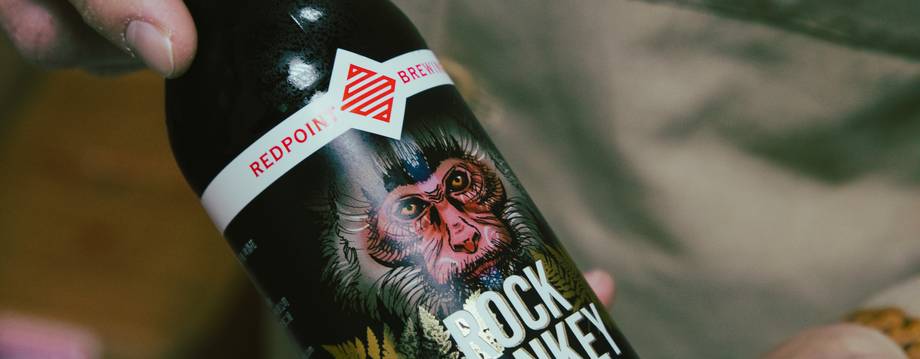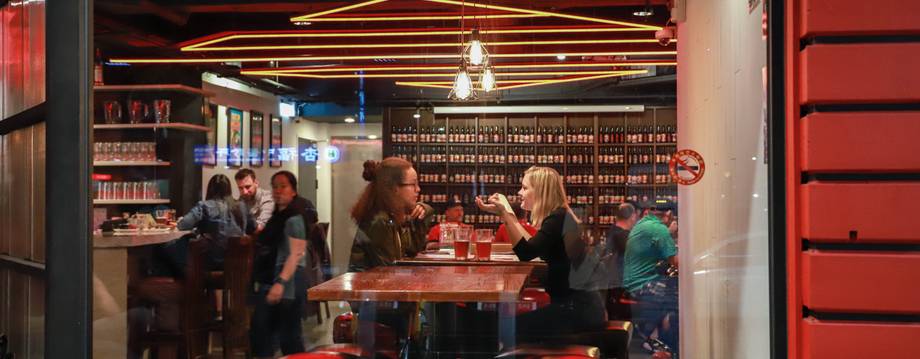Space invaders
Hemmed in by physical and logistical constraints, Redpoint has still managed to plant a flag for US-style craft brewing in Taiwan
Robyn Gilmour
Photos:
Doug Wilson Garry
Saturday 31 May 2025

This article is from
Taiwan
issue 118
Share this article
Anyone who has visited a brewery before will be familiar with the industrial settings they often call home. Warehouse units on the outskirts of cities tend to have the space a brewery needs, and rent is typically a little cheaper than it would be in the centre of town. In Taiwan, it’s mandatory for manufacturing businesses to operate within designated industrial zones, whether those be in or outside a city. This means space is in short supply, and breweries are not just looking for the kind of site they need, but they’re competing for said space with businesses from all other industries.
Redpoint Brewing Co is an hour and a half’s drive from Taipei, just outside Taoyuan City. Though the brewery has expanded over time, now occupying three neighbouring units, a “unit” is just wide enough for a Luton van to reverse into. Granted, each building is deep and three stories high, with brewing taking place across ground floors, and packaging and cold stores generally being shoehorned around supporting walls and elevator shafts on the first floor. Operations are much more substantial than they appear from the street — the brewery has the capacity to produce two million litres a year on its 35hl system — but to downplay the challenges posed by spatial constraints would be to do the Redpoint team a disservice.
“We’re definitely the weird white guys around here,” says Doug Pierce, the co-founder. His gruff tone says nothing of how well he gets on with Redpoint’s many neighbours — he and his co-founder Spencer Jemelka frequently trade beer for the varied skills and specialities of nearby businesses, whether that’s metal fabricators, electrics manufacturers, or mechanical workshops. It also conceals a deep love of Taiwan, a country he and Spencer both came to from the US; Doug, 23 years ago with the semiconductor industry, Spencer, 17 years ago on a scholarship. The pair met playing rugby for the Taipei Baboons (both now play for the Silverbacks), and bonded over their shared nationality and love of homebrewing.

Having seen craft beer take off in the US, the pair figured it would soon reach Taiwan and so hedged their bets, graduating to contract brewing in 2013. However, contract brewing quickly revealed how far behind the Taiwanese beer industry was. Brewers weren’t equipped to brew American-style beers, and so in 2015 the pair decided to go it alone, taking on the first of their now three units, and managing operations between them, with packaging help from their girlfriends at the weekend. Redpoint was the first foreign-owned brewery in Taiwan, and the first brewery to domestically produce an IPA and a craft lager.
Being the first is never easy, and the lead time on imports was a major challenge in setting up, maintaining, running, and expanding the brewery. “We live on an island, you can’t get anything domestically here, so we got real good at importing,” says Doug. To this Spencer adds that even today the lead time on ordering grain from Germany is three and a half months. As such, everything has to be bought in bulk, and forecast for four to six months ahead. “That lead time has also meant it’s been really important to keep a solid inventory of spare parts,” says Spencer. “Every piece that can break, you spare it, because if you’re trying to import something from the States, it takes forever.”
Consider this need to maintain an extensive inventory and it once again becomes apparent why space is an issue. “So when we first started no one was doing craft, right? So our bottle supplier’s minimum order was a million bottles,” Spencer continues. “We talked them down to 100,000, but they wouldn’t hold them for us, so we just had to bring them all in on pallets, and our entire second floor was literally just covered.” Doug and Spencer take it all in their stride. It’s just another challenge, and they’re managing it, but Doug acknowledges that there are ways that Taiwanese breweries — most subject to the same spatial constraints — could be making it easier for themselves.
When more craft producers came on the scene, Doug suggested setting up an association so that breweries could place orders for malt and hops together, and in doing so benefit from economies of scale. It didn’t get much traction. People were maybe a little suspicious, or sceptical of what could come from reliance on others. Doug says that culture is slowly changing, and while he speaks highly of all breweries on the scene, he hopes that one day they’ll embrace and celebrate collaboration a little more. After all, large scale action will be required to educate Taiwanese consumers about craft beer.

PHOTO: Redpoint Brewing
“Whether a beer is yellow or black is just about the extent of people’s knowledge here,” says Doug, highlighting the fact that it was illegal to brew beer in Taiwan until 2002. Before joining the World Trade Organisation, all alcohol produced in Taiwan was made by the state. Since then, the beer market has gone from tightly controlled to largely unrestricted, with avenues for selling beer operating on a pay-to-play basis.
“Everything's built here for big players,” says Spencer. “There's just not a lot of space for small producers like us. We don’t do a lot of retail because if we send a pallet of beer to 7-Eleven and there’s a dint in one of the cans, they send the whole pallet back, which we just don’t have the space for... Similarly, if the beer doesn’t sell within a given period of time, they send it back, even if the product is still well within its best before. So we mostly sell through bars and restaurants where everything gets used and there’s a better profit margin. That said, it's pay-to-play here, so to get into a nightclub, Heineken or Carlsberg will just pay the venue 50,000 to 100,000 US dollars just to sell their beer. We don’t have that kind of money, but we do design and build kegerators, so if a customer is ordering 120-150 litres a week, we can give them one of those.”
Doug and Spencer know better than most that there are easier places in the world to brew and sell craft beer, but that’s not really the point. “The quality of life here is off the charts,” says Doug. “There’s a reason we’ve been here for so long. You want to talk about easy living? It is easy living here. Taiwan has some of the best healthcare in the world, in terms of accessibility. It’s incredibly safe and people here are so unbelievably honest. You could leave a bag of cash on the train, let it do a loop and expect it to either still be there when you get back, or for it to be returned to you.” It’s easy to see why Taiwan is a country they now call home.
Share this article

